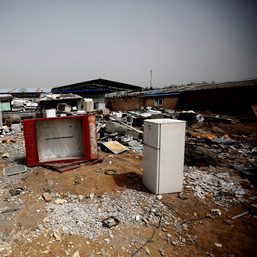SUMMARY
This is AI generated summarization, which may have errors. For context, always refer to the full article.

MANILA, Philippines – The government on Wednesday, August 9, assured the Philippines’ biggest business organization that it would address all 10 reforms in businessmen’s wishlist, including the entry of a major telecommunications player, completion of the Circumferential Road 6 (C6), and the resolution of the crisis in Marawi City, Lanao del Sur.
Finance Secretary Carlos Dominguez III said other items on the wishlist being reviewed by the government include:
- improving the ease of doing business through the convergence of different agencies
- identifying the best competitive advantage versus other countries in the Association of Southeast Asian Nations (ASEAN)
- rallying the government and the private sector to drive growth and competitiveness
- improving agricultural support infrastructure and services such as farm-to-market roads, cold storage, and irrigation
- improving health services by expanding PhilHealth coverage
- addressing the job-skills mismatch
- improving land tenure security in all areas
“This is a running list, but then consultations between the private sector and government should be an ongoing affair. On our part, we will study closely these suggestions to see what specific policy actions might be taken,” Dominguez said in a media briefing after the 2017 Sulong Pilipinas forum in Mandaluyong City.
This was the 2nd Sulong Pilipinas forum of the administration of President Rodrigo Duterte. His first was held in Davao City, which gathered some 450 businessmen who came up with recommendations on how to improve the economy and business environment. (READ: Duterte on business sector’s 10-point wishlist: ‘It’s doable’)
“We expect Sulong 2017 to be as productive as Sulong 2016. The participants in this forum concluded just now worked hard to ensure this would be a productive dialogue.This is how public-private partnership works. The government side delivers the medium. The private sector delivers the content. It is a productive symbiosis,” Dominguez said.
NOW: Secretaries Dominguez, Evasco and Davao Chamber of Commerce chief holds press con on 2017 Sulong Pilipinas event @rapplerdotcom pic.twitter.com/EjlWDrRIpI
— Chrisee V. Dela Paz (@chriseedelapaz) August 9, 2017
Better telco services
George Barcelon, president of the Philippine Chamber of Commerce and Industry (PCCI), zeroed in on the need for a 3rd major telco player in the Philippines, as it is seen to lower prices and improve services.
“It’s quite expensive if you consider the right-of-way. In Singapore, what they do is that the companies jointly set up infrastructure with the government – wherein the antenna, the investment in that, is partly shared. The companies, their role is just to compete at the services, and the likes. And I would like to think that that is really something we should look into especially since we’re archipelagic, we’re spread all over,” Barcelon said.
Dominguez said Information and Communications Technology Secretary Rodolfo Salalima has vowed to improve competition in the telecommunications sector.
“Salalima said we are really moving towards more competition, better services, lower cost for telecom sector,” Dominguez told reporters. He, however, did not say how the government will welcome a new telco player.
Outdated laws restrain prospective joint ventures and the entry of new players, thus limiting competition in the telco industry, the Philippine Competition Commission earlier said.
It was in July 2016 when senators Paolo Benigno Aquino IV and Joel Villanueva filed Senate Bill No. 695 or the amendments to the Public Service Act.
Among the amendments to the 80-year-old Public Service Act or Commonwealth Act No. 146 is the exclusion of telecommunications from the definition of a public utility.
This would mean there would be no need to amend the 1987 Constitution to liberalize the country’s telecommunications sector and allow foreign players to operate as public utilities.
“It’s not available and the cost is quite prohibitive. In that sense, maybe we should change the model to be more competitive,” PCCI’s Barcelon said.
Resolving the Marawi crisis
Another topic discussed was the ongoing clashes between government troops and terrorists in Marawi City. The battle broke out in downtown Marawi on May 23, leading to Duterte’s declaration of martial law in the entire Mindanao and the suspension of the privilege of the writ of habeas corpus there.
According to Ronald Go, president of the Davao City Chamber of Commerce and Industry, the Marawi crisis and martial law in Mindanao caused hotel occupancy rates in Davao City to plunge to 30% in the 1st half of 2017, from an all-time high of 90%.
“We suffered initial losses due to martial law, mostly in tourism. Basically the tourism sector, particularly hotels, was hurt. Others, however, continued to run on a normal basis. But now, we are bouncing back,” Go told reporters. (READ: ‘Normal working day’ for businesses amid martial law in Mindanao)
Socioeconomic Planning Secretary Ernesto Pernia said the government has allocated “P5 billion from the balance of the year” for the rehabilitation of Marawi City.
“There’s already a plan for rehabilitation and recovery. As long as fighting stops, the rehabilitation crew can start coming in,” Pernia told reporters on the sidelines of the briefing.
In the 2016 Sulong Pilipinas, the recommendations of businessmen were later adopted as the socioeconomic reform agenda of the Duterte administration. – Rappler.com
Add a comment
How does this make you feel?
![[OPINION] Fossil fuel debts are illegitimate and must be canceled](https://www.rappler.com/tachyon/2024/04/IMHO-fossil-fuel-debt-cancelled-April-16-2024.jpg?resize=257%2C257&crop_strategy=attention)
![[WATCH] John Kerry: You can’t solve climate crisis without addressing ocean’s challenges](https://www.rappler.com/tachyon/2023/12/cop28-united-states-john-kerry-december-2-2023-reuters-001.jpg?resize=257%2C257&crop_strategy=attention)



There are no comments yet. Add your comment to start the conversation.